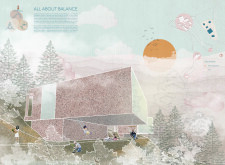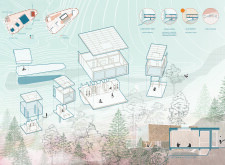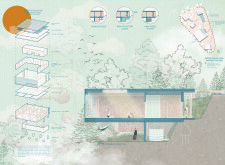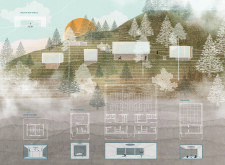5 key facts about this project
Set in the scenic mountains of Portugal, the design features five individual structures within the Vale De Moses Yoga Retreat. The overall concept blends modern architectural elements with natural surroundings to create a village atmosphere that fosters well-being and peace. Each building is designed for specific activities like yoga, meditation, and relaxation, allowing for both community interaction and personal time.
SUSTAINABILITY FOCUS
A key element of the design is its focus on sustainability. The retreat uses innovative features such as a grey water system and solar glass on the rooftops to achieve self-sufficiency. Rainwater is collected and filtered for use as drinking water and tap water. This approach reduces dependency on outside sources and promotes responsible resource management.
MATERIAL SELECTION
The choice of materials is vital in supporting the project's sustainable goals. Laminated timber and cross-laminated timber (CLT) are prominently used. These materials are renewable and help lower the overall carbon footprint of the buildings. Photovoltaic glass is also integrated into the design, contributing to energy efficiency while fitting visually with the beautiful landscape.
COMFORT AND WELLNESS
Creating a healthy living environment is an essential focus. The design considers both air quality and visual comfort. Cork insulation is employed to maintain thermal comfort and ensures a pleasant atmosphere within the structures. The use of compost toilets and grey water tanks for irrigation highlights the commitment to an ecological lifestyle, encouraging sustainable practices among the inhabitants.
Natural light fills the interiors, enhancing the connection between the spaces and the landscape. Expansive views invite residents to appreciate the surrounding beauty, while carefully arranged outdoor spaces provide areas for reflection and relaxation.























































